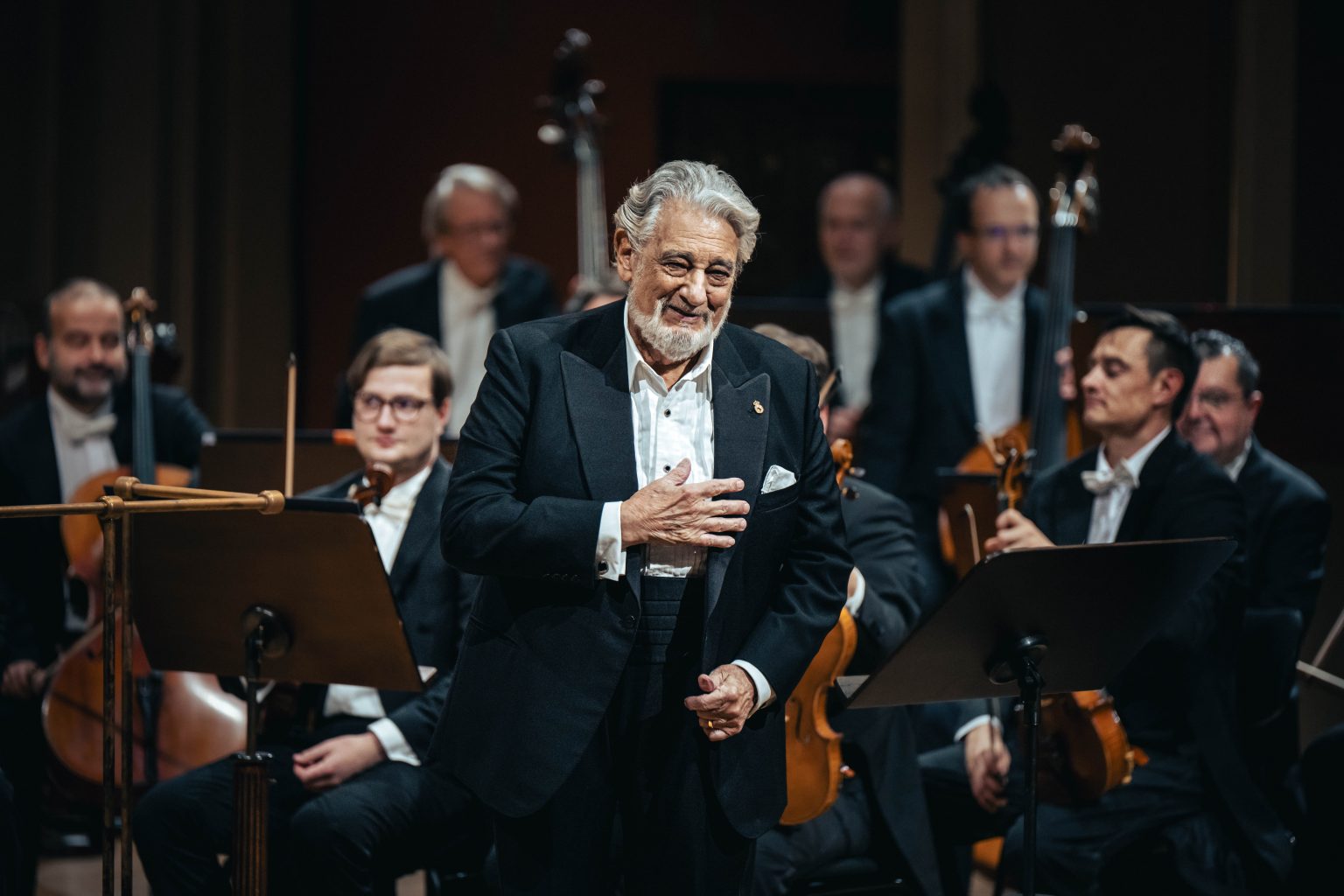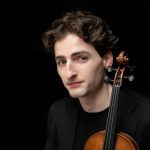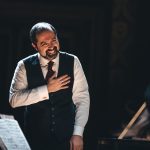by Ivan Žáček
On Thursday, October 16, 2025, Prague welcomed one of the great legends of the opera world — Spanish singer Plácido Domingo — for a recital designed for three voices. Sharing the stage with him in the Rudolfinum were two distinguished contemporary singers: Slovak soprano Adriana Kučerová and Czech mezzo-soprano Ester Pavlů. Their orchestral partner for the evening was the Czech Radio Symphony Orchestra, conducted by the seasoned Slovak opera maestro Rastislav Štúr.
A Glimpse into Domingo’s Musical Microcosm
The operatic portion of the evening occupied the first half of the program and was devoted primarily to Verdi’s operas, complemented by two figures of Italian verismo — Umberto Giordano and Giacomo Puccini. The second half was dedicated to zarzuelas, the distinctly Spanish genre that profoundly shaped Plácido Domingo’s musical soul during his teenage years. Inserted somewhat incongruously among them were pieces by Charles Camille Saint-Saëns, Léo Delibes, and Franz Lehár.
It could be said that this living legend offered, through his carefully chosen program, a kind of glimpse into his personal musical universe. Let us recall that Domingo ranks among the most versatile singers of our time, his repertoire encompassing more than 150 operatic roles — from Alfredo, his first tenor part, through Rodolfo, Turiddu, Hoffmann, Canio, Don Carlo, and Manrico, extending across a vast panorama of Italian and French opera to Lohengrin, Walther von Stolzing, and Parsifal.
All this stands alongside the zarzuelas that first brought him recognition in Mexico, where his parents had settled, as early as the late 1950s. Characteristically, Domingo began his career as a baritone, rose to fame as a tenor, and later returned to the baritone range — a shift that became definitive in 2009 with his portrayal of Simon Boccanegra.
Thus, the second half of the recital — featuring his baritone repertoire — took on an autobiographical dimension, a return to the singer’s artistic beginnings. And in this intimate quality lay something profoundly moving: a homecoming of one of the greatest, most musical, and most versatile voices of the past half century to the roots that shaped him.
The Slovak soprano Adriana Kučerová and Czech mezzo-soprano Ester Pavlů proved to be sensitive, sympathetic, and tactful partners in this nostalgic reflection, both contributing significantly to the success of the evening.
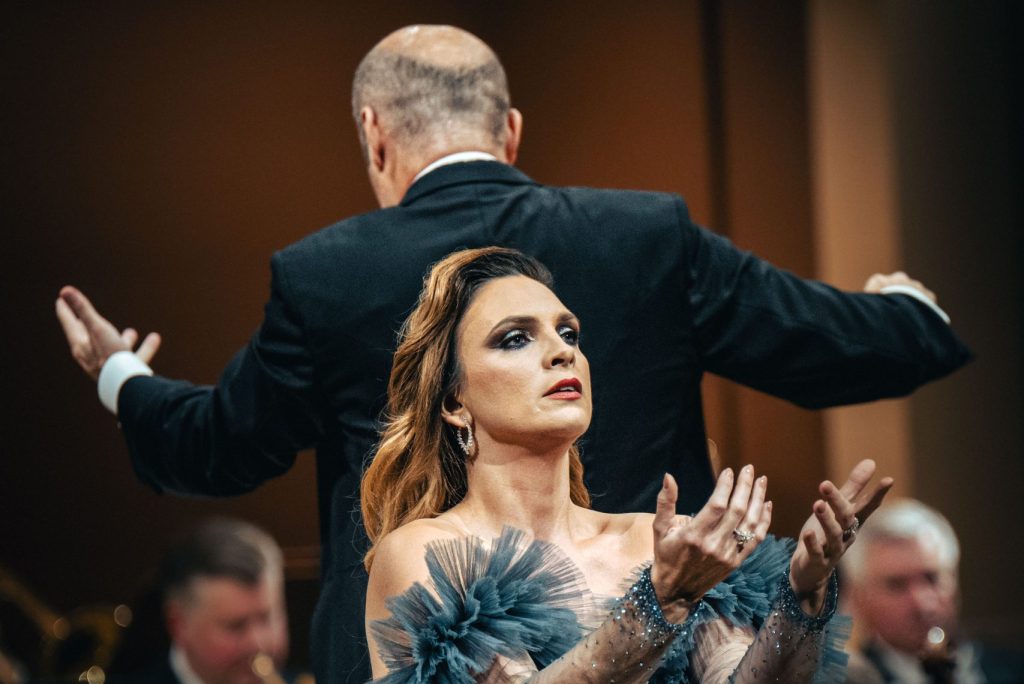
Baritone or Tenor?
So — Plácido Domingo as a baritone? Not quite. From the very first number, Nemico della patria — Gérard’s recitative and aria from Umberto Giordano’s Andrea Chénier — Don Plácido made it clear that the tenor within him is still very much alive. Though he now sings baritone roles, the considerable overlap between the two ranges allows his tenor reflexes and tone production to shine through. Even in the upper quarter of the baritone tessitura, he sings like a tenor — without the support or weight that true baritones rely on.
Chénier’s arioso, not exactly an ideal opener, immediately revealed certain aspects that would define the evening — none of which, however, concerned his vocal quality. Astonishingly, Domingo’s voice remains in excellent condition: its noble color still resonates beautifully in the baritone register, and his advanced age shows barely any trace in his singing. Only his breath occasionally shortened, and the projection of his tenor-baritone instrument was understandably somewhat reduced.
Here, I consider it a serious misstep that conductor Rastislav Štúr did not opt for a generally softer orchestral dynamic, allowing the singer to project more freely against the full orchestral sound. The female voices, of course, carried far better in their range. But for a recital conceived as a tribute to Domingo, it was quite an oversight that the Czech Radio Symphony Orchestra so often overpowered the star of the evening — suggesting perhaps that there had been no rehearsal with the singer. Or am I mistaken?
In Macbeth’s final aria, Pietà, rispetto, amore, Domingo displayed every hallmark of Verdian style and gave a masterclass in the art of bel canto. Though he now needed to replenish his breath for longer legato lines — biology will have its say — he did so with consummate skill. One only had to accept that some phrase endings were a touch hurried. Hardly a flaw, yet I was surprised to see him singing entirely from the score, eyes rarely leaving the page — even in duets with Adriana Kučerová and Ester Pavlů. Still, this had no negative impact on their performance; on the contrary, the immediacy, warmth, and gallant rapport between Domingo and his two partners made these moments some of the most engaging of the night.
The duet of Germont and Violetta, Pura siccome un angelo from La Traviata, in which the Slovak soprano showed deep emotional insight into the dramatic core of their fateful exchange, stood out as the evening’s highlight for me. A charming contrast followed with Hanna and Danilo’s duet Lippen schweigen from Lehár’s The Merry Widow, in which Don Plácido even danced a few steps to the not-so-Viennese waltz, alongside a radiant Ester Pavlů.
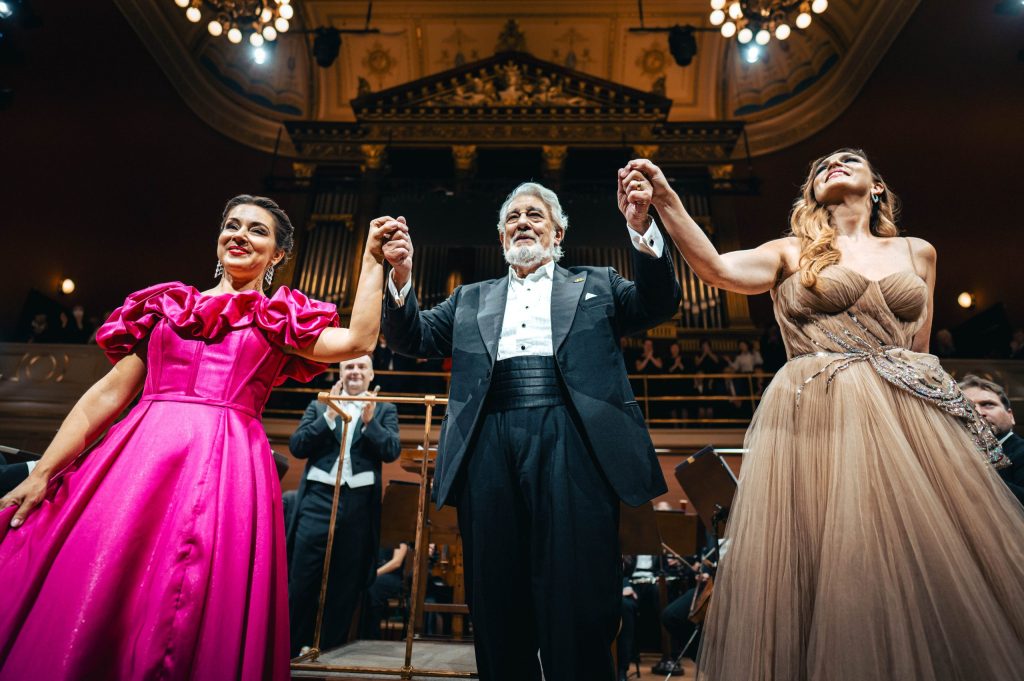
The Czech mezzo also impressed in Dalila’s aria Mon cœur s’ouvre à ta voix from Saint-Saëns’s Samson et Dalila, delivering beautifully sustained legato lines with an even, glowing tone. Less convincing, however, was Eboli’s aria O don fatale from Verdi’s Don Carlo, which demands either the full dramatic context or a singer capable of conjuring it on the concert stage.
Both singers joined forces once more in the Flower Duet, Viens, Mallika, les lianes en fleurs from Delibes’s Lakmé, performed as one of several encores. The enthusiastic audience was then treated to even more delights — including beloved zarzuelas, Granada by Agustín Lara, and Non ti scordar di me by Ernesto de Curtis.
Plácido Domingo: The Opera Legend
October 16, 2025 – 7:30 p.m.
Rudolfinum, Dvořák Hall, Prague
Program
Giuseppe Verdi: La forza del destino – Overture
Umberto Giordano: Andrea Chénier – “Nemico della patria”
Giacomo Puccini: Gianni Schicchi – “O mio babbino caro”
Giuseppe Verdi: Macbeth – “Perfidi… Pietà, rispetto, amore”
Giuseppe Verdi: Don Carlo – “O don fatale, o don crudel”
Giuseppe Verdi: La Traviata – “…D’Alfredo il padre”
Gerónimo Giménez: La boda de Luis Alonso – Intermezzo
Jacinto Guerrero: Los Gavilanes – “Mi aldea”
Ruperto Chapí: Las hijas de Zebedeo – “Al pensar en el dueño (Carceleras)”
Federico Moreno Torroba: Maravilla – “Amor, vida de mi vida”
Camille Saint-Saëns: Samson et Dalila – “Mon cœur s’ouvre à ta voix”
Léo Delibes: Les filles de Cadix
Franz Lehár: Die lustige Witwe – “Lippen schweigen”
Reveriano Soutullo: La leyenda del beso – Intermezzo
Manuel Penella: El gato montés – “Me llamabas, Rafaeliyo”
Performers
Plácido Domingo – baritone
Adriana Kučerová – soprano
Ester Pavlů – mezzo-soprano
Czech Radio Symphony Orchestra
Rastislav Štúr – conductor


